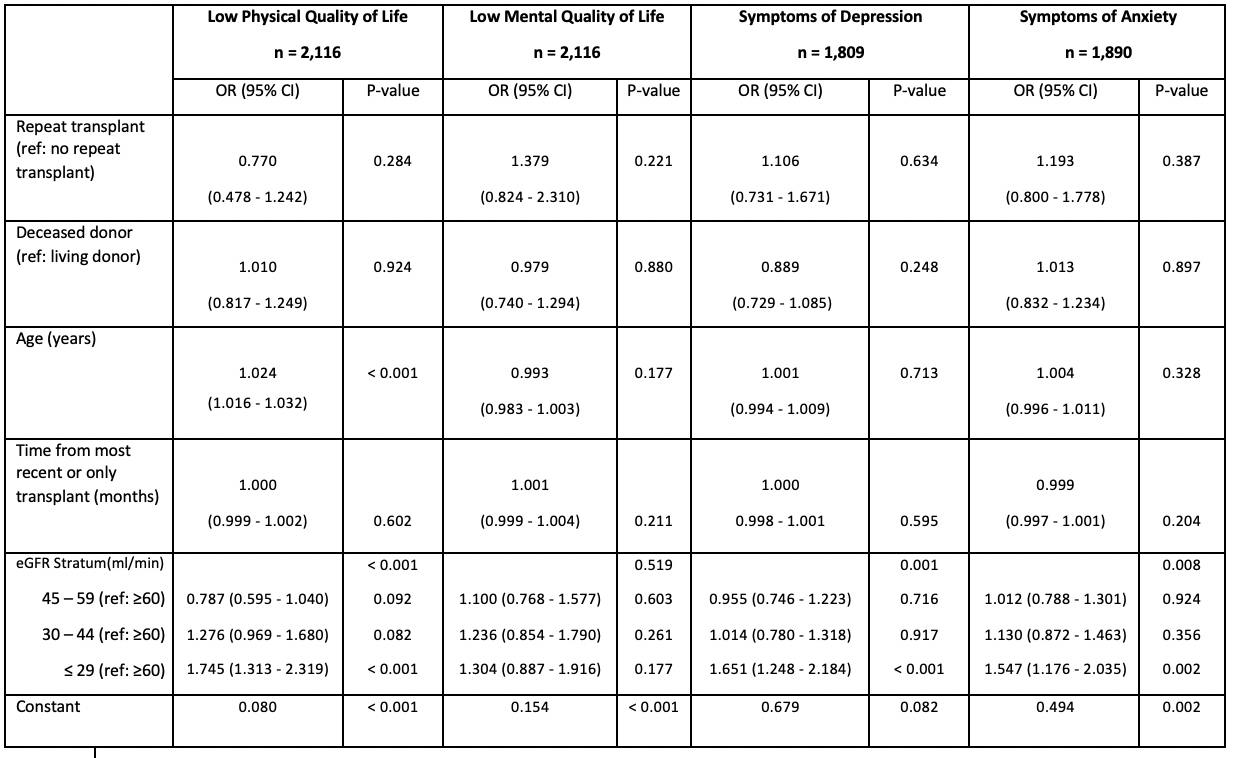Association of Kidney Function with Patient Reported Outcomes After Kidney Transplantation
G. S. Kochar, S. A. Rega, I. D. Feurer, A. Dreher, H. Schaefer, D. Shaffer, R. C. Forbes, C. W. Pinson, B. P. Concepcion
Nephrology, Vanderbilt University Medical Center, Nashville, TN
Meeting: 2021 American Transplant Congress
Abstract number: 875
Keywords: Glomerular filtration rate (GFR), Kidney transplantation, Quality of life
Topic: Clinical Science » Kidney » Kidney Psychosocial
Session Information
Session Name: Kidney Psychosocial
Session Type: Poster Abstract
Session Date & Time: None. Available on demand.
Location: Virtual
*Purpose: Our study aimed to determine the association of posttransplant eGFR with patient reported outcomes (PROs) and, specifically, the risk of reduced health-related quality of life (HRQoL) and increased symptoms of depression and anxiety with reduced eGFR.
*Methods: PROs, assessed since 2002 in adult kidney transplant recipients at a single center, included the physical and mental summary components (PCS and MCS) of the Short Form 36 Health Survey, Centers for Epidemiologic Studies Depression Scale (CES-D), and Beck Anxiety Inventory (BAI). PROs were interpreted as being based on relevant norms (low if <35 for the PCS and MCS, and present if >9 or >7 for the CES-D and BAI). eGFR was classified as stages of chronic kidney disease (CKD): 1 or 2, 3a, 3b, and 4 or 5. The effects of eGFR on longitudinal PRO data were analyzed using multivariable mixed effects models that adjusted for age, donor type, time posttransplant, and prior transplantation. Using the most recent PRO observation per patient, multivariable logistic regression models determined the likelihood of substantively impaired PROs in relation to CKD stage.
*Results: PRO data were reported by 2,116 adult kidney transplant recipients (mean age = 49.9 ± 13.1 years, male gender = 58%, re-transplantation rate = 5.5%, mean time from transplant to last (or only) observation = 74 ± 1.3 months). All covariable-adjusted longitudinal models (n >8,400 observations) demonstrated statistically significant associations between decreasing eGFR and lower PCS and MCS scores as well as greater symptom severity for depression and anxiety (all p <0.03). Substantively reduced PCS scores were 75% more likely at CKD stages 4 or 5 when compared to CKD stages 1 or 2. There was no effect of CKD stage on the likelihood of substantively reduced MCS. CKD stage 4 or 5, compared to CKD stage 1 or 2, carried a 65% greater likelihood of symptoms of depression and a 55% greater likelihood of symptoms of anxiety.
*Conclusions: Using a robust dataset of PROs, we found that kidney transplant recipients with CKD stages 4 and 5 are at increased risk for lower physical quality of life, and greater likelihood of having symptoms of depression and anxiety. Vigilant monitoring and earlier interventions by clinicians may be warranted in this vulnerable population.
To cite this abstract in AMA style:
Kochar GS, Rega SA, Feurer ID, Dreher A, Schaefer H, Shaffer D, Forbes RC, Pinson CW, Concepcion BP. Association of Kidney Function with Patient Reported Outcomes After Kidney Transplantation [abstract]. Am J Transplant. 2021; 21 (suppl 3). https://atcmeetingabstracts.com/abstract/association-of-kidney-function-with-patient-reported-outcomes-after-kidney-transplantation/. Accessed January 7, 2026.« Back to 2021 American Transplant Congress

